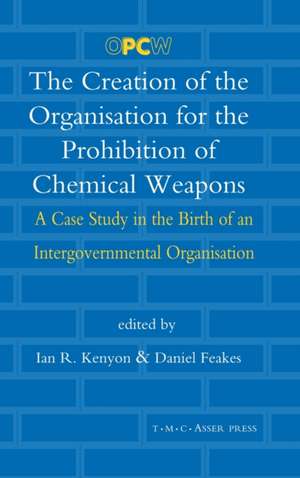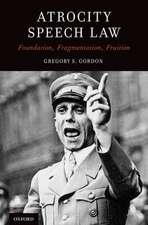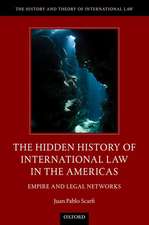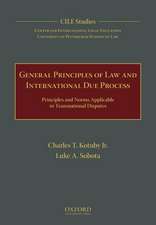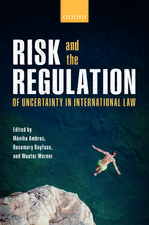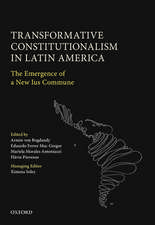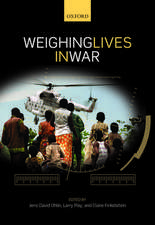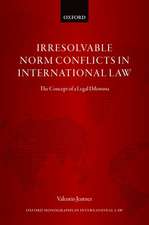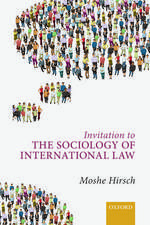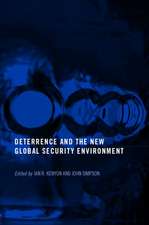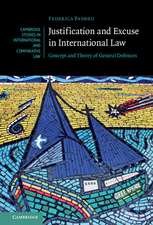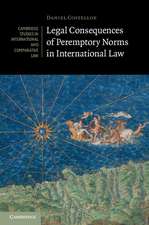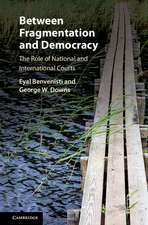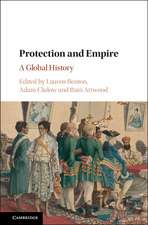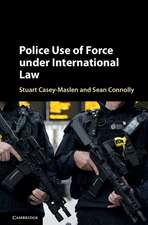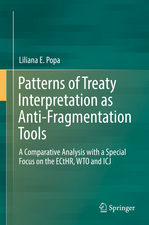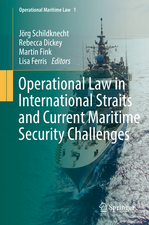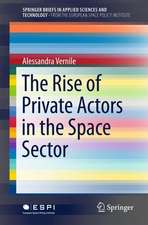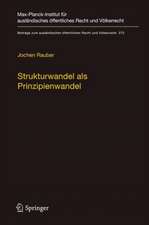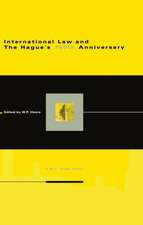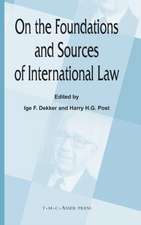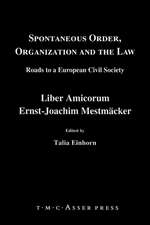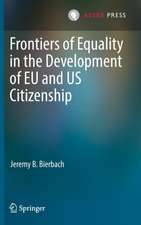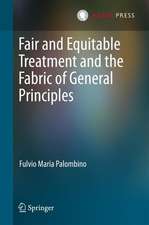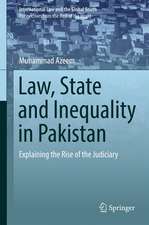The Creation of the Organisation for the Prohibition of Chemical Weapons: A Case Study in the Birth of an Intergovernmental Organisation
Editat de Ian R. Kenyon, Daniel Feakesen Limba Engleză Hardback – 6 iun 2007
This book is the first comprehensive study of the creation and work of the Organisation for the Prohibition of Chemical Weapons (OPCW). It summarises the history of the development and use of chemical weapons. The authors describe the negotiation of the Chemical Weapons Convention and the work of the Preparatory Commission for OPCW. They review the first ten years of operation of the Treaty and the organisation.
The book describes how the abstract concepts contained in the Treaty were translated into an operational international organisation, able to send inspectors to military and civil chemical facilities around the world. It offers a detailed example of international multilateral diplomacy in action and provides a detailed case study of how a convention negotiated by diplomats is put into effect by a broad range of government officials and private actors. Last but not least, lessons are drawn for the creation of other treaty based organisations.
As such, the book is of great interest to academic libraries and students of International Relations, as well as government officials, legal scholars and experts involved in the implementation of international treaties.
The publication of this book coincides with the 10th anniversary of the Treaty entering into force.
Ian R. Kenyon was Executive Secretary to the Preparatory Commission for the Organisation for the Prohibition of Chemical Weapons (1993-1997). He is currently active as a Visiting Fellow at SPRU Science and Technology Research, University of Sussex and a Visiting Senior Research Fellow at the Mountbatten Centre for International Studies, University of Southampton. Daniel Feakes was the Harvard Sussex Program Researcher at OPCW (1997-2000). He is currently a Research Fellow at SPRU Science and Technology Research, University of Sussex.
The book describes how the abstract concepts contained in the Treaty were translated into an operational international organisation, able to send inspectors to military and civil chemical facilities around the world. It offers a detailed example of international multilateral diplomacy in action and provides a detailed case study of how a convention negotiated by diplomats is put into effect by a broad range of government officials and private actors. Last but not least, lessons are drawn for the creation of other treaty based organisations.
As such, the book is of great interest to academic libraries and students of International Relations, as well as government officials, legal scholars and experts involved in the implementation of international treaties.
The publication of this book coincides with the 10th anniversary of the Treaty entering into force.
Ian R. Kenyon was Executive Secretary to the Preparatory Commission for the Organisation for the Prohibition of Chemical Weapons (1993-1997). He is currently active as a Visiting Fellow at SPRU Science and Technology Research, University of Sussex and a Visiting Senior Research Fellow at the Mountbatten Centre for International Studies, University of Southampton. Daniel Feakes was the Harvard Sussex Program Researcher at OPCW (1997-2000). He is currently a Research Fellow at SPRU Science and Technology Research, University of Sussex.
Preț: 401.24 lei
Nou
Puncte Express: 602
Preț estimativ în valută:
76.79€ • 79.87$ • 63.39£
76.79€ • 79.87$ • 63.39£
Carte tipărită la comandă
Livrare economică 14-28 aprilie
Preluare comenzi: 021 569.72.76
Specificații
ISBN-13: 9789067042413
ISBN-10: 9067042412
Pagini: 319
Ilustrații: 342 p.
Greutate: 0.73 kg
Ediția:1st Edition.
Editura: T.M.C. Asser Press
Colecția T.M.C. Asser Press
Locul publicării:The Hague, Germany
ISBN-10: 9067042412
Pagini: 319
Ilustrații: 342 p.
Greutate: 0.73 kg
Ediția:1st Edition.
Editura: T.M.C. Asser Press
Colecția T.M.C. Asser Press
Locul publicării:The Hague, Germany
Public țintă
Professional/practitionerCuprins
Why we Need a Chemical Weapons Convention and an OPCW?.- How and why Opcw Came to the Hague.- Establishing the Preparatory Commission and Creating the Opcw Technical Secretariat.- Legal Aspects of the Preparatory Commission for the OPCW as an International Organisation.- Housing The New Organisation.- Recruitment and Training of Inspectors.- Preparing To Conduct Inspections.- Preparing for Disarmament: Articles III, IV and V.- Keeping Peaceful Uses Peaceful: Article VI.- National Implementation: Article VII.- Maintaining Honesty: Article IX.- Helping Those Threatened: Article X.- Cooperation In Peaceful Uses: Article XI.- The First Ten Years.- Lessons Learned.
Textul de pe ultima copertă
This book is the first comprehensive study of the creation and work of the Organisation for the Prohibition of Chemical Weapons (OPCW). It summarises the history of the development and use of chemical weapons. The authors describe the negotiation of the Chemical Weapons Convention and the work of the Preparatory Commission for OPCW. They review the first ten years of operation of the Treaty and the organisation.
The book describes how the abstract concepts contained in the Treaty were translated into an operational international organisation, able to send inspectors to military and civil chemical facilities around the world. It offers a detailed example of international multilateral diplomacy in action and provides a detailed case study of how a convention negotiated by diplomats is put into effect by a broad range of government officials and private actors. Last but not least, lessons are drawn for the creation of other treaty based organisations.
As such, the book is of great interest to academic libraries and students of International Relations, as well as government officials, legal scholars and experts involved in the implementation of international treaties.
The publication of this book coincides with the 10th anniversary of the Treaty entering into force.
Ian R. Kenyon was Executive Secretary to the Preparatory Commission for the Organisation for the Prohibition of Chemical Weapons (1993-1997). He is currently active as a Visiting Fellow at SPRU Science and Technology Research, University of Sussex and a Visiting Senior Research Fellow at the Mountbatten Centre for International Studies, University of Southampton. Daniel Feakes was the Harvard Sussex Program Researcher at OPCW (1997-2000). He is currently a Research Fellow at SPRU Science and Technology Research, University of Sussex.
The book describes how the abstract concepts contained in the Treaty were translated into an operational international organisation, able to send inspectors to military and civil chemical facilities around the world. It offers a detailed example of international multilateral diplomacy in action and provides a detailed case study of how a convention negotiated by diplomats is put into effect by a broad range of government officials and private actors. Last but not least, lessons are drawn for the creation of other treaty based organisations.
As such, the book is of great interest to academic libraries and students of International Relations, as well as government officials, legal scholars and experts involved in the implementation of international treaties.
The publication of this book coincides with the 10th anniversary of the Treaty entering into force.
Ian R. Kenyon was Executive Secretary to the Preparatory Commission for the Organisation for the Prohibition of Chemical Weapons (1993-1997). He is currently active as a Visiting Fellow at SPRU Science and Technology Research, University of Sussex and a Visiting Senior Research Fellow at the Mountbatten Centre for International Studies, University of Southampton. Daniel Feakes was the Harvard Sussex Program Researcher at OPCW (1997-2000). He is currently a Research Fellow at SPRU Science and Technology Research, University of Sussex.
